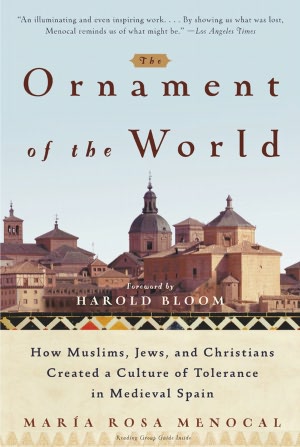I just finished reading Ornament of the World: How Muslims, Jews, and Christians Created a Culture of Tolerance in Medieval Spain by Maria Rosa Menocal.
At one level it describes a number of writers, principally but not exclusively from Spain, who wrote over a period of centuries from the Middle Ages to the Renaissance and even the modern age. She does not provide the reader with an understanding of their writings, but rather a kind of feel for how those writings fit into a long progression. She touches on The Song of Roland, The Cid, Averroes, Maimonides, al Idrisi, Ibn Khaldun, and Don Quixote among others.
Her major subject is the cultural history of Spain from the Berber conquest of the Visigoths to the Christian Reconquest and the expulsion of the Jews and Muslims. She emphasizes the Golden Age at the peak of the Umayyed Caliphate of Cordoba.
In that time the people of the book -- Muslims, Christians and Jews -- lived relatively harmoniously in city states. They shared a book culture enriched by the imports of technology and literature from all across the Muslim world. Notably they had access to the legacy of Greece transmitted via Byzantium, translated into Arabic, and added to by Arab intellectuals. Books were translated into Hebrew, then Latin and ultimately into vernaculars. Astrolabes and books made their way from Spain into northern Europe long before the transfer of Byzantine culture into Italy helped to spark the Italian Renaissance. The Golden Age of Cordoba was also an age when literature, music, decoration and architecture saw fruitful interchange between secular and religious. Arabic informed Hebrew and Latin, and left marks in Castilian and Ladino (not to mention Catalan, Portuguese and Gallego). Menocal sees the Usmayyed Cordoban culture as being so rich because of its willingness to include, live with and even foster diversity.
 |
| The Alhambra in Granada |
How did Spanish culture evolve from the war between Berbers and Visigoths to the tolerant age of the Umayyeds, and how did it devolve to the Spanish Inquisition? Menocal's answer is that both tolerance and intolerance are to be found in any society, and that tolerance came to dominate at one time, intolerance at a later time in Spain.
The final sections of the book note the civil war that occurred with the break up of Yugoslavia, as Croats, Serbs and Bosniaks fought a bitter war, and later as 9/11 led to new Christian-Muslim conflict. These later conflicts make us look back with some envy at the Golden Age of Cordoba.
 |
| Interior in the Alhambra in Granada |
Menocal's book asks a very important question. How do we assure that the better angels of our nature win in the cultural wars? It would be too much to demand a satisfactory answer.

No comments:
Post a Comment